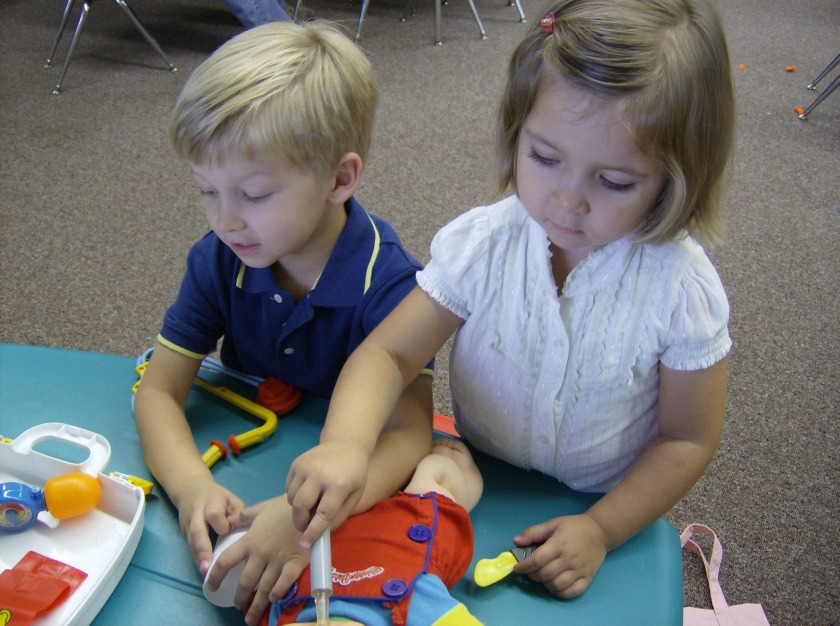
I think it’s almost impossible as a parent with a special needs child to not be constantly thinking about the future. I’ve been guilty a million times over. I’ve kept a running list of potential professions for J since he was 5.
-At 5 I thought he might have a potential career as a mail carrier. He created mental maps and physical maps of the neighborhood constantly, complete with Christmas lights, basketball hoops, and flags. The only big hang-up was dogs. At that time, J was terrified of dogs.
-I’ve gone back and forth on the idea of a grocery store bagger or even cashier. It’s a low skill job, and the days I feel like he’s failing dismally in academic areas, this is the job that comes to mind. But it’s not the perfect one either. At 7 he would have meltdowns if he saw people with freckles. He’s over that now, but he gets fidgety over spellings and numbers. Would he have a meltdown if he saw a name or a brand with a “misspelled” name? If a total rang up with a “bad number?”
-At 10 I thought he might have a future as a bus driver. The driver on my route to work was definitely on the spectrum. I learned a new obscure fact about the Beatles every day. If I was lucky he’d mix it up with some Buddy Holly trivia. But would J ever be able to learn how to drive? Would his brain blow up if he couldn’t hit the stops on time?
I keep a list of a dozen possible professions for J in my head. I’ve come up with stenographer, and proofreader or copyeditor. I’ve come up with the possibility of community college or a late entry to college (as a nontraditional student at 30 something. I had a student once in one of my classes who started college for the first time at 35 because of her anxiety issues). I keep the possibilities filed away because I want to make sure that once J graduates from high school, we’ll be able to find a place for him.
This week we his future was lightly touched upon at parent teacher conferences. I got to sit down with each of J’s three core teachers and listen to how they see J, how they’re trying to reach him on a relational level, and how they’re trying to reach him at an academic level. The question on everyone’s mind is, “how do I know if what we’re teaching J is what J needs?” What will he need to succeed in the future?
The answer is I don’t know. Do we push the more complicated steps in algebra when he’s frustrated with the first steps of algebra? Does he really need to know the pythagorean theorem or not? In reality, the answer is probably no. He will probably get along fine with a more “applied math” approach. In fact, I have gotten through life with just “applied math” skills. I have an MFA and not once have I had to graph an equation or use the pythagorean theorem since my first year as an undergraduate. I work at a university and can function just fine without the “higher math” in my life.
Right now I feel that it’s important to keep trying though. It’s by throwing things at J that we can find out what J is good at and not good at, because the truth is I really have no idea. We can see where his interests are and how to push him in those areas. He might be terrible at algebra but really good at geometry. He may be terrible at reading comprehension but a whiz at grammar and usage.
The more I try to plan J’s future out, the more I try to determine what he’s good at and not good at, the more I realize it’s a futile waste of my energy. He is always changing and progressing–dramatically sometimes. Strengths come out of nowhere. Two years ago, J became obsessed with Presidents of the United States. He knows the order of the 44 presidents starting with George Washington forward and can do it from Barack Obama backward. He knows when they were all born, died, how long their terms were, when their terms were. He just picked it up and he’s been on fire about it ever since.
This year it’s been the same way with geography. He knows almost every capital city of every country on this planet.He’s just started World Language Survey and within 2 days he could identify all 16 phrases—including differentiating between Arabic and Urdu—and I know it’s because of his interest in countries that he’s interested in what is spoken in different countries. We’re only a couple of weeks in—I don’t know how he’ll pick up new languages—but he’s incredibly smart at English grammar and usage. At the same time, he could be terrible and another language’s grammar and usage. I don’t know, but I’m glad we’re giving him a shot in World Languages.
Academically, he’s good at memorization. He’s bad with abstract concepts. It’s easy to feel discouraged and feel like he’s really “learning something” when he can’t yet apply a lot of his knowledge.

When Temple Grandin (an autistic woman and professor and Colorado State University in Animal Science and who also swears off Algebra ;)) came to Fargo back in 2013, one of the things she said that stuck out to me was, “It’s not just memorization. It start’s that way. The more they get out and learn specific examples, it builds their Google base.” Being exposed to those concepts–even if he doesn’t understand them all, builds his Google base.
She also talked about starting with “areas of strength” and spreading out from there. J loves maps—especially Africa. That’s a bridge to vocabulary words in his unit that have more social constructs around them. I really believe the more times he hears the word, “refugee, Apartheid, push and pull factors, colonization” at home or at school, the bigger we’re building that Google base. It will be there ready to access when he’s able to figure it out.
There’s no way to know an autistic child’s threshold for learning and growth—which gives you hope when things get rough. But in the back of your mind you are always terrified of failing them because you don’t know how far they can go if they have the chance. You don’t know how much to push or if it’s too much. You see stories like Carly Fleischmann‘s or Martin Pistorius‘s and you’re scared to stop pushing. I felt that from the teachers on conference night. I know it well. I think about it every day too.
You can watch Carly’s amazing story here:
So I keep monitoring, pushing and engaging him. I’m asking his teachers to keep doing the same. I keep that list of potential professions running through my head but in reality I can’t really plan his life out for him at this point. He changes so quickly. And the world is changing just as quickly too. Well educated millennials can’t get jobs right now. Technology is also eliminating jobs. Even if he were “neuro-typical” I couldn’t plan and predict his life for him.
For now, I think the only plan to go in is this: make him the best person he can be today.





